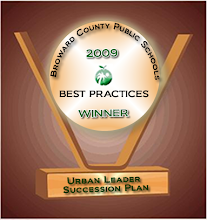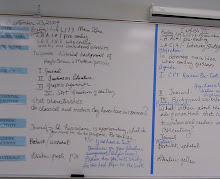Teachscape, the company that produces and maintains the Classroom Walkthrough tool and database, has updated to Classroom Walkthrough 3.0.1 (CWT 3.0.1) and is currently available at www.teachscape.com.
As of 09/30/2010, all Florida districts should use the CWT Florida Standard Look Fors-DA. The CWT 2.0 workspaces are still visible to administrators. All walks captured should be done with the new Data Collection Tool and CWT 3.0. Once this is activated, the current tool in use will be removed from your access, however, you can still run reports on data collected against these surveys/tools.
If you use a hand-held device, Teachscape recommends that you delete the 2.0 software first before downloading 3.0. You will find installation instructions in the Using the Data Collection Tool module in the Classroom Walkthrough Resource Library workspace. The Look Fors tool will be posted on the HRD website and is also available on the Teachscape website (www.teachscape.com) on the Resource Library tab: Introduction to CWT.
Please feel free to share this information with your leadership teams conducting Classroom Walkthroughs. CWT 3.0.1 courses are offered regularly. Dates, times and locations are available on ESS by searching for CWT 3.0.1 2-Day Training. For further information please contact Camille Spence, Coordinator, Teacher Development/HRD, at (754) 321-5013.
As of 09/30/2010, all Florida districts should use the CWT Florida Standard Look Fors-DA. The CWT 2.0 workspaces are still visible to administrators. All walks captured should be done with the new Data Collection Tool and CWT 3.0. Once this is activated, the current tool in use will be removed from your access, however, you can still run reports on data collected against these surveys/tools.
If you use a hand-held device, Teachscape recommends that you delete the 2.0 software first before downloading 3.0. You will find installation instructions in the Using the Data Collection Tool module in the Classroom Walkthrough Resource Library workspace. The Look Fors tool will be posted on the HRD website and is also available on the Teachscape website (www.teachscape.com) on the Resource Library tab: Introduction to CWT.
Please feel free to share this information with your leadership teams conducting Classroom Walkthroughs. CWT 3.0.1 courses are offered regularly. Dates, times and locations are available on ESS by searching for CWT 3.0.1 2-Day Training. For further information please contact Camille Spence, Coordinator, Teacher Development/HRD, at (754) 321-5013.
To download the memo with the updated 2-page CWT Florida Look Fors – Differentiated Accountability document, click here.








